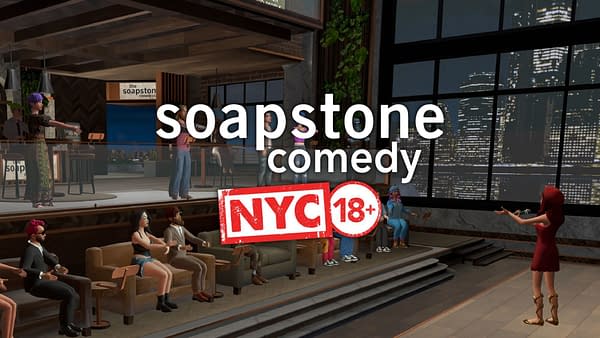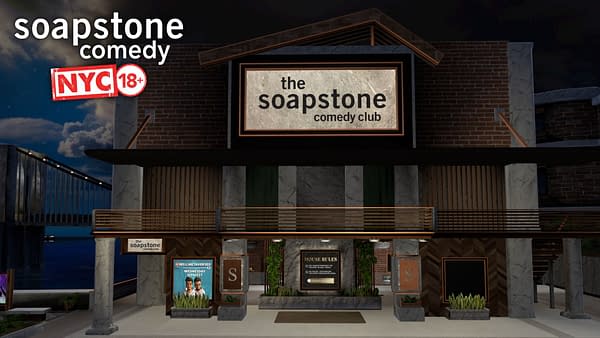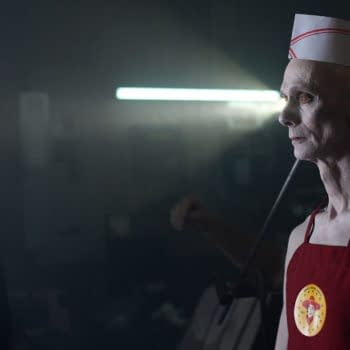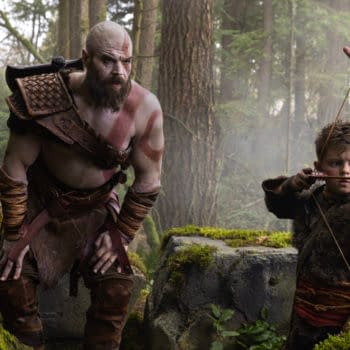Posted in: Games, Interview, Video Games, VR | Tagged: Aaron Sorrels, Meta Horizon, Soapstone Comedy
Soapstone Comedy Founder on Platforming Aspiring Comedians for Meta
Soapstone Comedy founder Aaron Sorrels spoke to Bleeding Cool about his new VR Meta Horizon experience for aspiring comedians & comedy fans.
Article Summary
- Soapstone Comedy offers a virtual reality stage for aspiring comedians via Meta Horizon and immersive VR worlds.
- Founder Aaron Sorrels built Soapstone to open up comedy opportunities to new talent and connect them with agents.
- Workshops, open mics, and competitions help users develop standup skills and win gigs in the VR comedy scene.
- Interactive games and community support make Soapstone's VR club a unique, engaging experience for all ages.
As technophiles are finally adopting virtual reality slowly into the mainstream, unique opportunities are emerging, and Aaron Sorrels (aka The Unemployed Alcoholic) embraced his most ambitious venture as the founder of Soapstone Comedy Club. Traditionally, aspiring comics would try their hand in the local comedy scene, trying to garner attention and tour in the area in hopes a scout or agent will take notice and bring him/her to greater fame and riches in the national scene and/or Hollywood. Soapstone, through Meta Horizon, will provide that opportunity for aspiring talent to try their hand directly on the Internet in front of a virtual audience. Sorrels spoke to Bleeding Cool about his journey to comedy, embracing his life as "The Umemployed Comic," how Soapstone streamlines the standup process virtually, integrating in-universe multiplayer games, and workshops.

Soapstone Comedy Founder on Creating a Nurturing Virtual Environment for Aspiring Comedians
BC: What inspired the creation of Soapstone Comedy for Meta?
AS: It was an interesting journey. When I started, I had a "grown-up" job, like most people, then I left that job to address alcoholism and got involved in a good recovery program. I started that healing journey, and I thought that it might take a couple of weeks. It ended up taking a little bit longer. A couple of weeks turned to a couple of months, and ultimately it ended up being over a year of being unemployed. During that time, I rediscovered who I was and found some new purpose, and decided I wanted to help people laugh. I became a comedian known as the "Unemployed Alcoholic," then as I got my feet under for that, Covid came along and shut down live comedy, so in looking for another way to add value and help people laugh, I ended up coming into the Metaverse.
How does an experience like this expand opportunities for comedians and audiences alike?
That's a great question, thanks for that. There are a lot of different levels of opportunity and discovery. We've discovered some people with comedic talent who come in will compete, and the funniest people will move on to the next round. Ultimately, they'll land a $1,000 paying gig to come in and do five minutes of comedy. The flip side is the discovery of people with the open stage at The Soapstone, which will allow people who might never get on a live stage to take the stage and try their hand at entertaining. A lot of people have discovered they're good at it. They're good at telling jokes, performing, hosting, and entertaining. The final thing I'd like to say about discovery is that there have been a lot of professional comedians we've been able to bring in, and it's cool to see them discover virtual reality.
Aside from the comedians' aspect, do you get agents or scouts also looking for talent?
Yeah, I've got a real good relationship with the Funny Business Agency, based out of Michigan, and they've been in the club. They're involved, and the people who go through the competition and win that $1,000 opportunity get on that agency's radar and system. Some connections are happening that way.

When you conceived of this idea, what were some of the biggest challenges in undertaking this ambitious goal? I imagine that there was some form of scaling back from the original vision or a lot of fine-tuning involved?
This has been a three-and-a-half-year journey so far, and we're just getting started. There have been a lot of pivots, changes, and decisions to modify the plan a bit, but what we've achieved here is at least as big as any ambitions that I had. Coming right into it, though, there were some surprises. I thought that the main attraction was going to be headliner talent coming in to perform, but what I found was, while people love that, and there's a huge component that is important, the main draw is making this experience accessible to people, like having the stage where people can get on and perform. We have a support community around, so if somebody wants to start their own show, there's a team that can help them produce that, market it, fill it with an audience, and everything in between.
What went into developing the games and activities portion?
A big part of it is just watching people. When people come in and pop around, if you see a dead zone where there's not much happening, then that'd be a good spot to put a game or something to entertain people. Also, with the games, you'll notice that when somebody purchases a game, it opens it up for the whole room. We wanted to make sure that any IWP (In-World Purchase), any kind of experience like that, it benefits the whole as opposed to just one.
Aside from the format aspect of it, was there like some workshop element where maybe some of your comedians and talents would be like, "Okay, we want to tell you how to do like the simple things in comedy or how to write." Is it something that you thought about doing?
Yeah, for sure. We've had professional comedians come in, talk to people, and coach them up. Oftentimes, after our headliner shows, we'll do a Q&A, and people will ask questions about their technique. We've also got a guy, speaking of people finding their show, we've got a guide who goes by Mr. Legends, who is starting a show called "Comedy Theory" and he's breaking down one aspect of comedy and helping the people in the audience hone that and understand it.
Among the choices Soapstone users can go are Hanalei Bay, which immerses you in a chill island vibe inspired by the magical Hanalei Bay in Kauai, Hawaii, which is available for ages 10+ and NYC, which casts a vibrant urban setting overlooking the NYC skyline for ages 18+. For more, you can check out Soapstone Comedy on Meta Horizon, YouTube, and Discord.
















